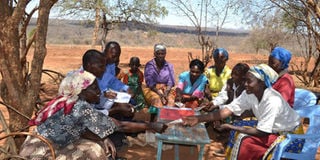Where the Galla goat is a bank

Members of Kwaituto Self-Help Group during a table banking meeting in Mwingi County. They keep their loans in goats to await rain. PHOTO | ISAIAH ESIPISU | NATION MEDIA GROUP
What you need to know:
- Galla goats, indigenous to northern Kenya, are known for their resilience and ability to cope with tough climatic conditions, but in eastern Kenya, they are more than that — they are used as currency for table banking initiatives by community groups.
- The use of Galla goats as banks has since spread in many parts of Mwingi, Kitui and neighbouring counties.
- Their table banking kitty, which kicked off with Sh13,000 on March 15, 2012 following a bumper harvest, had over Sh80,000 in cash by the beginning of November 2014 despite failing to grow crops for two consecutive seasons.
Six months ago, Jane Ngima needed to pay Sh1,200, the monthly instalment for a loan she had taken from her group in Mwingi Sub-county.
However, she did not have the cash as her maize crop had failed. “I sold a goat for Sh3,000, paid off the loan and used the balance to buy a young goat,” the Kithambioni Village resident says.
The kid has since matured and has already delivered triplets.
Jane is a member of the Kithambioni Self Help Group, for whom goats have become their bank.
Galla goats, indigenous to northern Kenya, are known for their resilience and ability to cope with tough climatic conditions, but in eastern Kenya, they are more than that — they are used as currency for table banking initiatives by community groups.
“We were introduced to table banking initiative by a humanitarian organisation back in 2010 so that we could borrow money from it to support our dry-land farming,” another member, Elizabeth Nguuti, says.
However, after they successfully harvested their farm produce that included maize, green grams and sorghum from the 2011/2012 season, and borrowed more money to prepare for the 2012/2013 season, the rains failed — forcing them to hold on the loans borrowed from the table bank.
Table-banking, named so as it happens over a table in a living room, is a group-funding strategy where members meet periodically to present their savings, contributions and loan repayments across a table.
They then loan the same money to a member or members who have projects to invest in. In many cases, women use the loans as capital for their livelihood projects.
DIFFICULT TO SERVICE
“We realised that we would misuse the loans if we kept money in our pockets to wait for the rainfall. Hence, it was going to be difficult to service them,” Elizabeth said.
They went back to the drawing board with ActionAid International Kenya — the organisation that had introduced them to table banking — to forge a way forward amid the tough and ever changing climatic conditions.
And according to Elizabeth, there was consensus among the farmers that the only way to keep their money safely and still earn interest from it was by investing in indigenous goats.
They preferred these goats because they are resilient to tough climatic conditions, they consume little fodder, they are prolific (sometimes reproducing in twins or triplets), their milk is highly nutritious, and they feed on a wide range of plants, including thorny and bitter ones.
But above all, there is always a ready market for goats at any time of the year.
Most of the goats in the area are the Small East African (SEA) breeds. But Serah Mwingi, ActionAid’s programme officer in Mwingi, said the Galla goats generally thrive in low altitude, preferably in acacia-bush country, and can tolerate extreme climatic conditions.
“They have a wonderful high growth rate after prolonged droughts and their large size enables them to reach browse that the SEA goats cannot reach, making them more resilient to tough climatic conditions like the ones in eastern Kenya,” said Serah.
ActionAid bought the goats from North Eastern Province, and sold them to residents of eastern Kenya.
“We bought the Galla goats using money we borrowed from the table banks, and towards the end of the year, when we were expected to repay the loans, our goats had reproduced.
SELL THE PARENTS
Therefore, we could sell the parents to service our loans and keep the kids, which would mature under six months,” Elizabeth said.
This allowed them to borrow more cash from the table bank as their kids matured. And since it did not rain again in the 2013/2014 season, the farmers once again invested their loans in goats, which kept reproducing every three months.
The use of Galla goats as banks has since spread in many parts of Mwingi, Kitui and neighbouring counties.
Today, another group called Kwaituto Self-Help Group, for example, with a membership of 25, of which 22 are women, commands more than 400 indigenous goats kept through the table banking initiative.
Their table banking kitty, which kicked off with Sh13,000 on March 15, 2012 following a bumper harvest, had over Sh80,000 in cash by the beginning of November 2014 despite failing to grow crops for two consecutive seasons.
“With goats, our cash is safe and is constantly multiplying with or without rainfall,” Kwaituto Self-Help Group patron Musili Kaka said.
Nicolas Mwanzia Kilaka, a member of Muangeni Self-Help Group in Kyusiani Village, Mwingi, says he will never abandon goats because “with them, we are sure that we will have our capital available even if it takes years before it rains.”
So far, according to ActionAid, 800 farmers in Mwingi alone are members of different groups that are practising table banking, and are keeping Galla goats.





